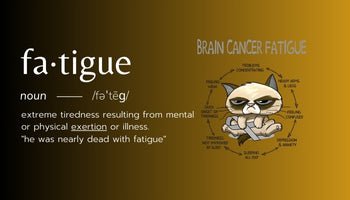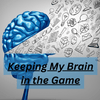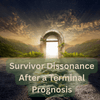Optune Fatigue: What You Need to Know as a Glioblastoma Patient

Optune Fatigue: What You Need to Know as a Glioblastoma Patient
When you are diagnosed with Glioblastoma, the word "treatment" takes on an entirely new meaning. It is no longer just a plan — it is a lifeline. For many, Optune becomes a key part of that journey. This FDA-approved device uses Tumor Treating Fields (TTFields) to disrupt cancer cell division in Glioblastoma. But along with hope, it can bring exhaustion. Optune fatigue is one of the most common complaints from users, and yet it is rarely talked about in depth. This blog aims to change that.
What Is Optune and How Does It Work?
Optune is a wearable, portable device developed by Novocure. It works by delivering low-intensity alternating electric fields — known as Tumor Treating Fields — directly to the scalp through adhesive transducer arrays. These fields interfere with cancer cell division, slowing down the growth of glioblastoma tumors.
Unlike chemotherapy or radiation, Optune does not rely on drugs or ionizing radiation. It is designed to be worn for at least 18 hours a day, ideally around the clock. That kind of commitment is intense — emotionally and physically. Many users report feeling drained, not just from the logistics of wearing the device, but from something deeper. That leads us to the burning question: Does Optune cause fatigue?
What the Research Says About Optune Fatigue
According to the EF-14 phase 3 clinical trial — a pivotal study evaluating Optune combined with temozolomide — fatigue was one of the most frequently reported side effects. In this trial, over 10% of participants experienced notable fatigue (JAMA Oncology). That figure may sound small, but in practice, the number is much higher when you consider how many patients already struggle with low energy from surgery, chemo, or radiation.
Another report from the Canadian Agency for Drugs and Technologies in Health (CADTH) also listed fatigue as a common complaint among Optune users. Their findings aligned with both patient surveys and physician reports across multiple countries.
Furthermore, Verywell Health outlines fatigue as one of the more persistent side effects of wearing Optune. Unlike nausea or rash, which may appear in flare-ups, Optune fatigue can feel constant and unrelenting.
Why Does Optune Cause Fatigue?
There is no single cause. Fatigue is likely the result of multiple overlapping factors, including:
-
Physical strain: Wearing Optune all day means carrying extra equipment. Even lightweight, it adds up.
-
Sleep disruption: The hum of the device, discomfort from the arrays, or fear of movement causing an error can interfere with sleep.
-
Mental load: The stress of wearing something so visible and associated with your illness creates emotional fatigue.
-
Therapy burden: Most people using Optune are also recovering from surgery or undergoing chemo. Fatigue may be cumulative.
Combine these with the everyday reality of fighting Glioblastoma, and it is no surprise so many of us report being completely wiped out.
Personal Experience: My Battle with Optune Fatigue
Let me speak plainly — I have Glioblastoma, and I use Optune. I want it to work. I am grateful for the science. But there are days when I feel like the device is draining the last bit of strength I have. Not physically — I can carry the battery pack. But the mental and emotional exhaustion? That is brutal.
The worst fatigue hits after a night of poor sleep. Maybe the arrays were itchy, or the cooling fan made too much noise. Maybe my brain just decided to remind me at 2:00 AM that I have brain cancer. Whatever the reason, the next morning I feel crushed. Not tired — depleted.
If you feel this way too, please know you are not alone. It does not mean you are weak. It means you are human.
The Difference Between Normal Tiredness and Optune Fatigue
It is important to understand the difference between typical tiredness and clinical fatigue. Regular tiredness improves with rest. Optune fatigue often does not. It can feel like a heavy blanket you carry all day — even after a full night of sleep.
Some warning signs you might be dealing with deeper fatigue:
-
Trouble concentrating or remembering things
-
Needing naps but not feeling refreshed
-
Feeling frustrated, irritable, or hopeless
-
Lack of motivation to do basic tasks
If this sounds like you, talk to your healthcare team. Your fatigue may be manageable — but only if they know about it.
What You Can Do About Optune Fatigue
1. Talk to Your Team:
Do not suffer in silence. Tell your neuro-oncologist or nurse. Sometimes they can adjust your medication, recommend therapies, or refer you to supportive care.
2. Focus on Restorative Sleep:
Practice good sleep hygiene. Try white noise machines to mask device sounds. Limit screen time before bed. Ask if melatonin or a sleep aid is appropriate for you.
3. Light Exercise:
As impossible as it sounds, gentle movement can boost energy. Even a short walk or stretch can release endorphins and improve circulation.
4. Mental Health Support:
Fatigue is not always physical. Therapy, support groups, or even journaling can lighten the emotional load. Mental exhaustion is just as real.
5. Prioritize Your Day:
Plan your day around your energy levels. Schedule important tasks early. Break things into small chunks. Use reminders or lists.
Hope and Honesty: Striking a Balance
There is a dangerous pressure in the cancer world to always be “strong,” “brave,” and “positive.” But that can be toxic. Sometimes the strongest thing you can do is admit you are exhausted. Not just “low energy,” but “I want to cry if someone asks me to do anything else today” tired.
And you know what? That is valid. That is powerful honesty. Admitting the toll Optune takes does not mean you are giving up. It means you are respecting the reality of your journey.
Long-Term Outlook: Does Fatigue Improve?
For some, fatigue levels out over time. Your body adjusts. Your mind adapts. But for others, it remains a daily challenge. If you reach a point where fatigue outweighs benefit, it is okay to re-evaluate your treatment plan with your doctor. There is no shame in setting boundaries for your body.
That said, many patients push through and find the fatigue is a price they are willing to pay for the chance at more time, more birthdays, more memories. The choice is personal. But it should be informed.
Final Thoughts: Be Gentle With Yourself
If you take nothing else from this blog, let it be this: you are doing enough. You are allowed to feel tired. You are allowed to talk about it. And you are allowed to ask for help. Optune fatigue is real, and the only way we make it manageable is by bringing it into the open.
Additional Resources:


 NEW ARRIVALS
NEW ARRIVALS APPAREL
APPAREL GIFT AND HOME
GIFT AND HOME COLLECTION'S
COLLECTION'S HOPE HUB
HOPE HUB BLOG
BLOG



